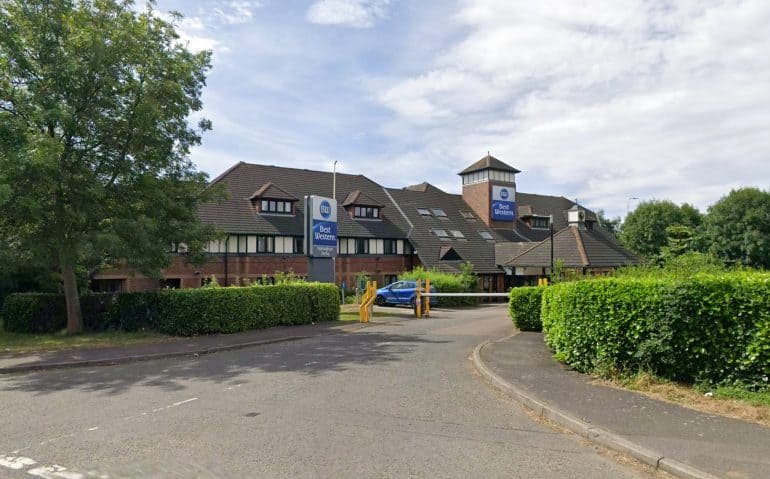-
 play_arrow
play_arrow
Erewash Sound Love Music - Love Erewash
-
 play_arrow
play_arrow
Writing East Midlands talks about their pivotal role in supporting creatives, in professional & community settings, in the East Midlands. They also discuss their local role within the national initiative "Beyond the Spectrum". Erewash Sound
Full Steam Ahead: Young people take the drivers seat to improve train services and unlock jobs
today7 May 2025 4

Young people will be able to take up new careers as train drivers three years earlier, to boost the number of drivers needed for reliable services and put more school and college leavers on track to step straight into work.
Thousands of jobs and apprenticeships will be made available to those between 18 and 20 years old as early as December, offering skilled roles, valuable experience, and long-term career opportunities whilst keeping our country moving, driving economic growth at the heart of our Plan for Change.
It will also help build up the rail workforce, preventing delays and cancellations caused by driver shortages which currently accounts for 87% of cancellations made the night before a service runs.
The decision to lower the age will future-proof the railways, reducing the over reliance on rest day working by getting more people into the driving seat and ensuring a steady stream of drivers entering the industry. The average train driver is 48 years old and rising, with 30% due to reach retirement age by 2029. Bringing young talent in these skilled roles now will bridge this gap, preventing any future shortages and ensuring consistent, reliable services for passengers.
In a profession that is less than 9% female and less than 12% represented by ethnic minorities, this will open professional opportunities to a much wider group of people.
This is an initiative to help deliver the Government’s Plan for Change by unlocking skilled jobs and safeguarding reliable train services, boosting the economy and improving living standards in the process.
Transport Secretary Heidi Alexander said: “We’re taking bold action to improve train services and unlock thousands of jobs. We’re committed to getting the economy moving and a big part of that is getting young people into the workforce, putting them on track for a skilled and fulfilling career which will boost growth across the country and help deliver our Plan for Change.
“We’re future-proofing our railways against delays and cancellations caused by a shortage of drivers, ensuring that we can provide reliable, passenger focused train journeys under Great British Railways for decades to come.”
This follows a consultation the Department undertook last year which received overwhelming support from across the industry and marks a significant step forward for rail reform.
Mick Whelan, General Secretary of ASLEF, the train drivers’ union, said: “ASLEF has been campaigning for many years for the lowering of the age at which drivers can start training. This decision – to allow people to leave school, or college, and join the railway in the driving grade at 18 rather than wait until they’re 20 – will increase diversity in the driver’s cab by encouraging more BAME people, more LGBT+ people, and more women – as well as more young people – to drive trains on Britain’s railways.
“Because, at the moment, young people who want to become train drivers leave school or college at 18, get other jobs, and we miss out as an industry as they don’t wait around until they turn 20 to find a career.”
Several other countries have already successfully and safely adopted a lower age limit, including the Netherlands, France, Germany and Switzerland, with other countries including Japan considering a change in law.
Transport for London also successfully opened up its train driver apprenticeships to 18-year-olds to drive trains on the underground network in 2007.
Everyone who takes on the role of a train driver must undergo rigorous training to ensure they are competent, qualified and fit to do so, ensuring the safe use of our railways for everyone.
Education Secretary, Bridget Phillipson said: “By opening up this vital sector to more young people, we’re not only creating a pathway to high-skilled careers but also addressing the skills shortages that hold back our transport network and economic growth. This is another step forward in our mission to break down barriers and create new opportunities for young people.
“This is our Plan for Change in action: bringing in fresh, diverse talent, tackling skills shortages, and helping to grow our economy across every part of the country.
"This is just one of the ways we’re delivering improvements to the railways ahead of the creation of Great British Railways (GBR). Once set up, GBR will bring track and train together, ending years of fragmentation and waste. GBR will relentlessly focus on driving up standards for passengers and proposals for how it will run, including plans for a powerful new passenger standards watchdog, are currently being considered."
Written by: Erewash Sound
Similar posts
Sponsors
ON AIR
SEARCH
CATEGORIES
RECENT POSTS

Drug and alcohol dependency support to be given a funding boost

Broken planning system must be fixed says Chamber as it backs report calling for overhaul

Rolls-Royce hails success of Westminster nuclear showcase

‘Sticking plaster’ support plan for pubs neglects other sectors says Chamber

Are you a member of the Ockbrook School Alumni?
103.5 & 96.8 FM
LOVE MUSIC
LOVE EREWASH
Office: 0115 888 0968
Studio: 0115 930 3450
Erewash Sound, The Media Centre, 37 Vernon Street, Ilkeston, DE7 8PD
© Copyright 2026 Erewash Sound CIC. All Rights Reserved. Company Number 6658171.






